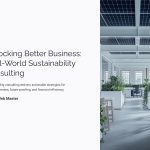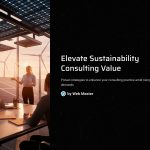 As sustainability becomes a central pillar of global business strategy, the demand for actionable, real-world consulting practices has surged. Companies are no longer just exploring eco-friendly practices to look good—they’re doing it to stay competitive, future-proof, and financially efficient. Recent updates to global ESG regulations, such as the EU’s Corporate Sustainability Reporting Directive (CSRD), have made transparency and measurability non-negotiable. As a result, consultants are under pressure to deliver insights that are not just strategic but also backed by hard data and tangible outcomes.
As sustainability becomes a central pillar of global business strategy, the demand for actionable, real-world consulting practices has surged. Companies are no longer just exploring eco-friendly practices to look good—they’re doing it to stay competitive, future-proof, and financially efficient. Recent updates to global ESG regulations, such as the EU’s Corporate Sustainability Reporting Directive (CSRD), have made transparency and measurability non-negotiable. As a result, consultants are under pressure to deliver insights that are not just strategic but also backed by hard data and tangible outcomes.
In this post, we dive deep into real-world cases that show how sustainability consulting is being applied effectively. From supply chain transformation to circular economy models, the following examples serve as a practical playbook for consultants, companies, and stakeholders aiming to embed sustainability into their business DNA. Whether you’re a sustainability officer, an executive, or a consultant, this post offers valuable insights to future-proof your organization.

How IKEA Integrated Circular Economy in Its Supply Chain
IKEA’s commitment to becoming climate positive by 2030 is more than just a slogan. Their partnership with sustainability consultants led to the introduction of circular design principles into product development. Through this, over 60% of its products are now designed using renewable or recycled materials.
Consultants helped IKEA assess lifecycle impacts of materials, advise on sustainable sourcing, and implement reverse logistics to handle returned products. Moreover, by collaborating with local recycling networks, they minimized their carbon footprint while cutting costs on raw materials. These efforts have not only improved environmental performance but have also built consumer trust—boosting long-term brand loyalty and sales.

Starbucks: Greening the Supply Chain from Bean to Cup
Starbucks worked with sustainability experts to develop a transparent, data-driven sourcing system called Coffee and Farmer Equity (C.A.F.E.) Practices. This model not only ensured ethically sourced beans but also reduced emissions across its entire agricultural network.
Consultants introduced new KPIs for social and environmental performance and conducted supplier training to elevate sustainability standards. As a result, over 98% of their coffee is now ethically sourced, helping Starbucks avoid reputational risks and improve investor confidence. This initiative also contributed to their broader goal of cutting carbon, water, and waste footprints by 50% by 2030.

Patagonia: Transparency as a Brand Differentiator
Patagonia has long been a gold standard for sustainability. But the company’s use of sustainability consulting has gone even further by adopting full lifecycle assessments for each product. With consultants’ guidance, Patagonia implemented supply chain audits, water use reduction plans, and eco-design frameworks that minimize environmental harm from design to delivery.
They were also one of the first in the apparel industry to publish supply chain maps and carbon footprint data per product online. This level of radical transparency has created not only a loyal customer base but also set industry benchmarks others are now chasing.

KPMG’s Net Zero Strategy Consulting for Global Banks
KPMG has emerged as a key player in sustainability consulting for the financial sector. One notable case involved guiding a European bank through the development of its Net Zero roadmap. The consulting team utilized climate scenario analysis, developed science-based targets, and introduced green bond mechanisms to drive low-carbon investment.
In addition to emissions reduction, KPMG implemented ESG risk metrics into credit risk models and developed impact tracking dashboards to monitor real-time sustainability outcomes. This helped the bank improve its ESG rating and attract environmentally conscious investors.

Unilever: Smart Metrics and AI in Sustainable Product Innovation
Unilever’s sustainability journey is characterized by innovation powered by digital insights. By collaborating with sustainability consultants and data scientists, the company embedded AI tools to assess environmental impacts at the R&D stage.
One key outcome was their “Smart Label” initiative, which uses AI to predict product sustainability scores even before launch. The consulting team also helped them establish supplier blockchain systems for tracking palm oil and other controversial ingredients, ensuring full traceability and compliance with regulatory standards.

Key Lessons and Future Outlook for Sustainability Consultants
These real-world applications highlight several universal takeaways for consultants:
- Data-driven approaches amplify impact and improve accountability.
- Transparency builds stakeholder trust and brand equity.
- Insustainability consultingdustry-tailored KPIs are crucial for measurable success.
- Innovation must be embedded across operations—not just isolated projects.
Looking ahead, consultants will need to harness AI, blockchain, and IoT technologies to stay competitive. Moreover, alignment with globally recognized frameworks such as GRI, TCFD, and SBTi will become increasingly important. Clients are seeking not only advisors but innovation partners who can accelerate their sustainable transition.
*Capturing unauthorized images is prohibited*



